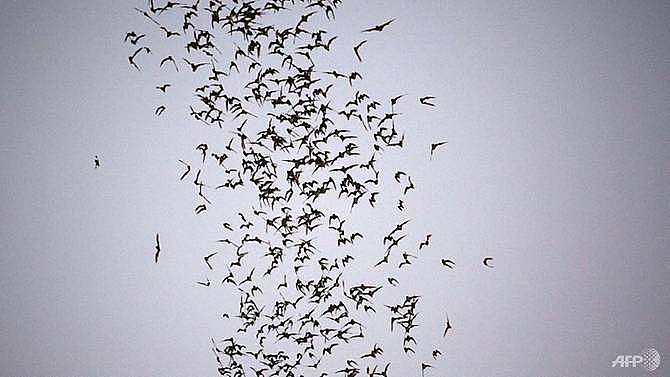Bats to blame for pig-killer virus in China: Study
 |
| The findings that a pig virus in China came from bats, based on genetic analysis, underlined the urgency of tracking viruses in animal "reservoirs" such as bats, researachers wrote in the science journal Nature. (AFP/Ye Aung Thu) |
The finding, based on genetic analysis, underlined the urgency of tracking viruses in animal "reservoirs" such as bats, they wrote in the science journal Nature.
"This study highlights the importance of identifying coronavirus diversity and distribution in bats to mitigate future outbreaks that could threaten livestock, public health, and economic growth," said the paper.
The researchers used DNA to pinpoint the cause of a mysterious disease that caused diarrhoea, vomiting, and death in piglets in China's Guangdong Province.
They identified a never-before-seen coronavirus which they dubbed Swine Acute Diarrhoea Syndrome (SADS). It does not appear to sicken humans.
The virus, the team found, came from horseshoe bats in a region near the birthplace of SARS - Severe Acute Respiratory Syndrome - some 15 years ago.
Highly infectious and deadly, the SARS virus killed nearly 800, almost one in ten.
Many new human infectious diseases - including SARS and Ebola - have an animal origin.
The study findings should serve as "a warning of viral interspecies transmission between wildlife and domestic animals," study co-author Zhengli Shi told AFP.
It also underlined "the importance of long-term surveillance for viruses in their natural reservoirs."
This does not mean we should go out and kill all horseshoe bats, added Shi.
"Wildlife is important in ecosystems," she told AFP. "It's normal that wildlife carry many viruses, bacteria, fungi, etc. As long as human society keeps away from wildlife, there is (a) very low chance of interspecies transmission."
What the stars mean:
★ Poor ★ ★ Promising ★★★ Good ★★★★ Very good ★★★★★ Exceptional
Related Contents
Latest News
More News
- France supports Vietnam’s growing role in international arena: French Ambassador (January 25, 2026 | 10:11)
- Foreign leaders extend congratulations to Party General Secretary To Lam (January 25, 2026 | 10:01)
- Russian President congratulates Vietnamese Party leader during phone talks (January 25, 2026 | 09:58)
- Worldwide congratulations underscore confidence in Vietnam’s 14th Party Congress (January 23, 2026 | 09:02)
- Political parties, organisations, int’l friends send congratulations to 14th National Party Congress (January 22, 2026 | 09:33)
- 14th National Party Congress: Japanese media highlight Vietnam’s growth targets (January 21, 2026 | 09:46)
- 14th National Party Congress: Driving force for Vietnam to continue renewal, innovation, breakthroughs (January 21, 2026 | 09:42)
- Vietnam remains spiritual support for progressive forces: Colombian party leader (January 21, 2026 | 08:00)
- Int'l media provides large coverage of 14th National Party Congress's first working day (January 20, 2026 | 09:09)
- Vietnamese firms win top honours at ASEAN Digital Awards (January 16, 2026 | 16:45)

 Tag:
Tag:




















 Mobile Version
Mobile Version